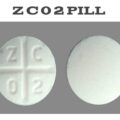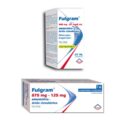Memoril is a powerful supplement that is used in the management of moderate to severe Alzheimer’s disease, mental confusion, forgetfulness, memory disorders, and impaired reasoning. Memoril is made with brain health-boosting ingredients that include magnesium oxide, gelatine, ginkgo dry leaf extract, selenium-enriched yeast, L-ascorbic acid, nicotinic acid, DL-alpha-Tocopherol acetate, pyridoxine hydrochloride, thiamine hydrochloride, and riboflavin
Memoril is a perfectly balanced combination of ginkgo, vitamins, and active substances for memory, suitable for both – the elderly and intensively working people.
- Vitamins B6, B12and folic acid help to maintain normal psychological function and reduce the sense of tiredness and fatigue.
- Vitamins B6 and B12help to maintain the normal nervous system, normal energy metabolism, and red blood cell formation.
- Folic acid contributes to normal blood formation.
Ginkgo extract supports central and peripheral blood circulation and thus helps the human body to continuously supply the brain with a sufficient quantity of oxygen and energy. It helps against vertigo. Vitamins B6, B12, and folic acid improve nervous system activity. Vitamins C, E, and selenium are antioxidants that enhance the effects of ginkgo extract and improve mental activity.
Other research, published in JAMA, similarly concluded that ginkgo extract was safe to use and possibly effective in stabilizing and possibly improving cognitive and social functioning in patients with dementia for between 6 and 12 months. Researchers believe that ginkgo supplement like Memoril improves cognitive function because it promotes good blood circulation in the brain and protects the brain and other parts from neuronal damage.
Composition
| 1 capsule of Memoril contains: | ||
| Ginkgo (Ginkgo biloba) leaves dry extract | 30 mg | NRVS* |
| Vitamin B6 | 5 mg | 357 % |
| Vitamin B12 | 5 µg | 200 % |
| Folic acid | 100 µg | 50 % |
| Vitamin E | 5 mg | 42 % |
| Vitamin C | 30 mg | 38 % |
| Beta carotene | 5 mg | |
| Selenium | 10 µg | 18 % |
NRVS* – nutrient reference values
Dosage of Memoril
The recommended dose of Memoril is 1 capsule 1-2 times daily with a glass of water.
- Do not exceed the stated recommended daily dose.
- Also do not store above 25 °C.
- Moreover, keep out of the reach of children.
Side Effects of Memoril
The following is a list of possible side-effects that may occur from all constituting ingredients of Memoril. This is not a comprehensive list. These side-effects are possible but do not always occur. Some of the side effects may be rare but serious. Consult your doctor if you observe any of the following side effects, especially if they do not go away.
- Abnormal gait
- Balance disorders
- Blood clotting
- Breathlessness
- Confusion
- Difficulty in passing stool
- Dizziness
- Drug allergy
- Elevated liver function test
- Fatigue
- Fits
- Fungal infections
- Headache
- Heart failure
- High blood pressure
- Inflammation of liver
- Inflammation of the pancreas
- Psychotic reactions
- Seeing or hearing things that are not really there
- Sleepiness
- Tiredness
- Vomiting
Memoril may also cause side effects not listed here. If you notice other side effects not listed above, contact your doctor for medical advice. You may also report side effects to your local food and drug administration authority.
Memoril drug interaction
As with any medication, care is needed to prevent interactions with other drugs and other risks. Even ibuprofen combined with Memoril can increase the risk of internal bleeding.
Patients with blood circulation disorders or individuals on anticoagulants, such as aspirin, are at risk of experiencing undesirable effects after taking Memoril.
Those taking selective serotonin reuptake inhibitors (SSRI) as antidepressants should not take Memoril as it inhibits monoamine oxidase, reducing the effectiveness of the medications. Combining the two may also increase the risk of a potentially fatal condition known as serotonin syndrome. Examples of SSRIs are Prozac or fluoxetine, and sertraline, also known as Zoloft.
Memoril can also exaggerate both the good and bad effects of another type of antidepressant, known as monoamine oxidase inhibitors (MAOIs).
Memoril contains long-chain alkylphenols, which are highly allergenic. People who are allergic to poison ivy and other plants with alkylphenols should completely avoid taking Memoril.
Memoril And Other Brain Boosting Activities
Beyond taking Memoril capsule to boost mental health, here are five top suggestions on how to boost brain health:
Weave heart-pumping exercise into your daily routine: A surprising amount of evidence points to this as one of the major ways to boost brain health. In addition to lowering your risk of hypertension and diabetes, improving mood and sleep, and helping with weight control, aerobic exercise may activate certain beneficial genes in the brain. Benefits accrue no matter what age you start.
Take care of any medical problems: Chronic diseases can affect the benefits you derive from Memoril. Studies at the University of California, Berkeley, found that chronic stress causes the body to generate fewer neurons than normal and more myelin-producing cells. This changes the ratio of gray matter to white matter in the brain. Diabetes, heart disease, stroke, and hypertension are all known to damage brain health. The good news: You can reduce your risk of each of these health conditions—or potentially control them better.
Get enough sleep, and get help for existing sleep problems: There’s increasing evidence that sleep disorders can cause problems with mental functions—including memory. Two of the most common sleep zappers: obstructive sleep apnea and stress. Even while taking Memoril get a good amount of sleep. Without it, you can’t form or maintain the pathways in your brain that let you learn and create new memories, and it’s harder to concentrate and respond quickly. Sleep is important to a number of brain functions, including how nerve cells (neurons) communicate with each other.
Review the medications you’re taking with your doctor: Some drugs, such as sedatives for anxiety, can affect thinking. The researchers found that anticholinergic drugs in general were associated with a higher risk of dementia. More specifically, however, anticholinergic antidepressants, antipsychotic drugs, anti-Parkinson’s drugs, bladder drugs, and epilepsy drugs were associated with the highest increase in risk.
Stay socially engaged: Challenging your brain by learning new things can enhance the many benefits of Memoril. Even better is pursuing interests that connect you with others. It’s probably better for brain health to have a conversation over lunch with a friend than to memorize numbers in reverse.






